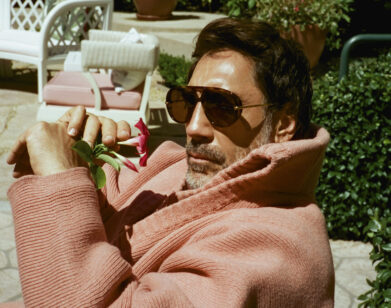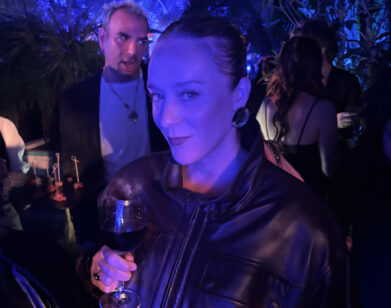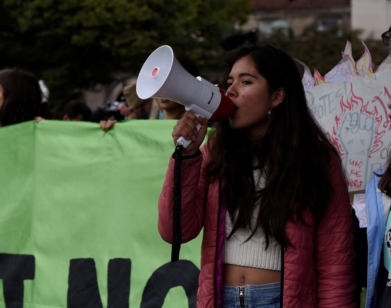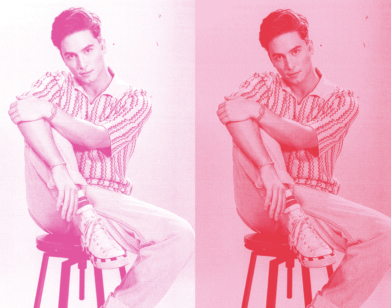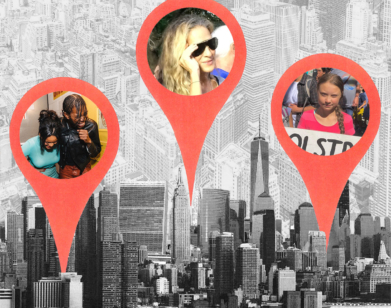Javier Bardem, Climate Crusader and Lover Of Penguins
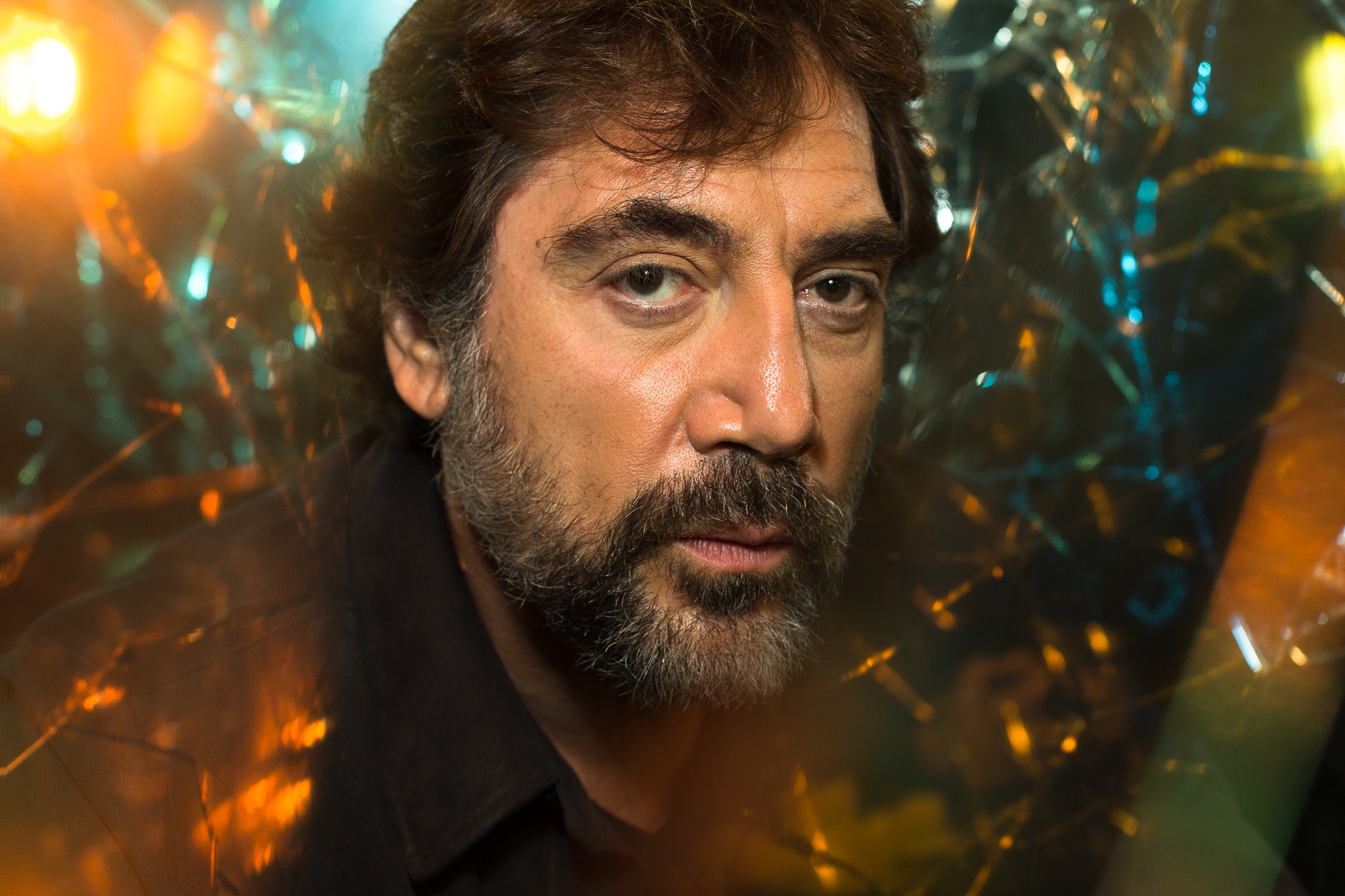
The Javier Bardem we see in Sanctuary, the new eco-documentary in which he embarks on an arctic expedition with Greenpeace, is a far cry from the actor we’ve come to know onscreen. In it, the 50-year-old Spaniard sheds the chilling persona he’s cultivated in films like No Country for Old Men and Skyfall for that of amateur explorer—the kind who stares off into alien landscapes, as though he can’t quite believe where he is, and who smiles giddily when he sees a family of penguins (his favorite animal) sliding down an icy hill. At one point, while he struggles to put on his snowsuit and a pair of boots, Bardem turns to the cameraman and asks facetiously, “Do you really have to shoot this? I have a career man, you can’t do that to me!”
Shot with his brother Carlos and director Álvaro Longoria over 10 days in January of 2018, the film is the latest chapter in Bardem’s ongoing quest to preserve the Arctic Ocean by creating the world’s largest ocean sanctuary. When we met with him ahead of the film’s TIFF premiere, the Oscar winner stressed the importance of saving the world’s oceans, which he believes is a crucial component to solving our planet’s climate crisis. “It was eye-opening,” he says. “When you go to these remote areas and you see that the things that we use in Madrid have an impact on remote areas like the Arctic Ocean, it’s like, ‘Holy shit.’”
Initially, Bardem was reluctant to get in front of the camera, for fear of overshadowing the scientists and biologists who’ve made this mission their life’s work. But he understood that his presence alone means more eyeballs, which was more than enough to convince him. After all, for Bardem, this is personal. “I have two kids, they’re eight and six,” he says. “I know that when they are 18 and 20 they will look at my face and people of my age and they will say, ‘Shame on you, because you knew. How come now we can barely breathe?’ Because it’s going to happen that fast, not in the near future. So let’s do something together, but let’s not deny it. Let’s not turn a blind eye.” Here’s Bardem on celebrity activism, going vegan, and the magic of Greta Thunberg.
———
DAN BARNA: Was making this film one of the most difficult things you’ve ever done?
JAVIER BARDEM: It was one of the most awe-inspiring things in the sense that I was just with my eyes and ears wide open, listening and learning from the guys who know what they’re doing and who have been doing it for ages. I had it in my mind that I didn’t know anything about anything. I just know that I worry about climate change because I live in Spain and there’s no such thing as seasons, more or less. Either it’s very hot or very cold, and degrees are rising every year.
BARNA: I was just in Paris and Italy for the summer and I couldn’t believe how hot it was—it was shocking.
BARDEM: I’m 50 and I remember when I was ten, those summers in Madrid were not the summers that we live in today. It’s way too hot. Things have changed very dramatically, very quickly. So when they asked me to join the campaign, I was like, of course I’ll do it. I never considered myself an activist or anything like that, but it’s obvious it’s happening and I just want to learn.
BARNA: When did you decide to turn the expedition into a documentary?
BARDEM: The only thing I said to them was, “Can I bring a camera? Can I do what I know to do, which is movies?” And then I didn’t know what to shoot, what to do, but the movie was happening as we were there. It came out by itself.
BARNA: Those are the best kind of documentaries, where you kind of just let the camera roll and it unfolds in front of you.
BARDEM: Yeah, and there was no such thing as plan, we were just there. Of course, it is what it is, it’s not Star Wars.
BARNA: Some of those landscapes kind of look like they could be from Star Wars.
BARDEM: Exactly. We had a great cameraman named Fabio Nascimento, who is a Brazilian photographer and was an inspiration. He shot all these amazing images, which are priceless.
BARNA: Seeing that environment on screen is one thing, but what’s it like being there in person? How would you describe it to somebody who’s never been? It looks otherworldly.
BARDEM: It is. It is like out of this world and at the same time, I was imagining it being freezing cold and it wasn’t. It was January, which is the warmer season, because otherwise it would be too cold, but again, they said “It’s way too hot, it’s way too warm, it should be way more freezing cold.” And here’s the first problem: we were walking in t-shirts, surrounded by icebergs. Do you want to deny that? It’s up to you.
BARNA: You talk in the film about the vibe on the ship. Tell me a little bit about what that was like and did it remind you at all of being on a film set, just in terms of everyone doing their own jobs to achieve one common goal?
BARDEM: Yeah, there’s a danger. There’s a person who organizes everything, there are people of different ages. They can be very young, and they’re not what we think, like a bunch of hippies smoking grass. There are people that have been six months away from their families, they’re not getting any money. I mean yeah, they’re being paid, but peanuts. And they are doing this for ages. For example, the captain of the ship has been doing this for more than thirty years and he’s been in Russian jails like six times. They’ve been giving all they have and all they know for all of us.
BARNA: What do you think possesses somebody to do something like that? Is it just a singular belief in their mission?
BARDEM: I’m an actor, I know all my limitations, and I’ve been gifted by knowing so many people in so many disciplines. I also did a documentary on Medecins Sans Frontier/Doctors Without Borders, and I had the chance to go. The documentary is called Invisibles, which came out in 2008. I was there on the field with them and again, at first I went to help, but you are not them, and you have to be like them. You have to be able to be surrounded by chaos and drama and life-and-death situations and just cope with it in a way I’m not able to.
BARNA: And you also have to be willing to give up the comforts of normal life, whether its warmth or a blanket or a nice bath and a good meal.
BARDEM: Exactly. And these people pay a price because of what you just said. They come back to the world that we know, and they don’t fit.
BARNA: It’s kind of like being a soldier and going to war.
BARDEM: Yes, and you have to be genetically driven. You have to be that person. And I’m not, I’m an actor, but I’m very interested and very honored to have an element of helping and listening in any way I can.
BARNA: One thing I identified with was your love of penguins, and the way they bring you back to your childhood. When I was a kid I was obsessed with whales, and I remember sending little checks to Greenpeace and drawing whales on them. I was so obsessed with saving whales, and as adulthood comes, you kind of lose sight of that. Was seeing those penguins a reawakening for you?
BARDEM: Totally, and you would have been amazed, because there was a moment when we were surrounded by six whales. That was the most mystical moment of the whole trip. That brought tears to my eyes. It was a moment in which I felt nature really was all over me in a way that I would never have expected to see or experience, because you are seeing them in their own habitat. Of course, Greenpeace is very careful about how you approach them, and how to be still with them. And of course, the penguins were amazing, but the whale moment was like, whoa.
BARNA: That must really reinforce why you’re there in the first place.
BARDEM: Yes. We have to do something about it on an individual level, but we are also going to need policies and administrations to guide us and to invest money in creating a different environment for all of us to be able to live differently from how we live now, which is fast and comfortable.
BARNA: Are you making any personal changes to your day to day life?
BARDEM: Well, I became a vegan like a month ago.
BARNA: Really?
BARDEM: Everybody has to be aware of what they want to do. Over the last year, the meat tasted too much like meat, and the fish tasted too much like fish. And I’m like, What am I doing? Do I need such a big amount of fish and meat everyday? No, I don’t. I saw fishermen with their little tiny boats, and you see that they have to go deeper and deeper and deeper into the ocean because there’s no more fish near the shore. Then they can get killed by the storms and all the situations that happen there, when they realize they cannot come back. It’s affecting everything. I’m flying, but I try to make sure that every location that I have to go to is less than two hours by flying.
BARNA: The upcoming U.S. election is deeply important. How do we make politicians stand up and take notice of these issues?
BARDEM: It’s all about the younger generations. This Greta [Thunberg] girl is amazing, what she is achieving. They are way more prepared than we are. I’m 50 years old, and they know way more than I do. They’re willing to go ahead and say, ‘Enough, enough, enough. We care and we are the future.’
BARNA: They’re the ones who have to deal with our negligence.
BARDEM: They can vote in four years time. So people in my generation, we have to support those young generations. We are here to make sure you are safe, but you are the ones who are going to create a change, so that there’s no more Trump.
BARNA: Do you think as a celebrity, you have a responsibility to take an active role in causes that you believe in?
BARDEM: I don’t think that’s a responsibility. I think of it more as a gift. And of course in the moment when you have an opinion, you’re going to have enemies. I know, because I’m outspoken about many things. That’s the way I was raised by my mother. Yes, I’m an actor, but that’s a job. I’m a citizen. Do I use my platform to speak? Yeah, like anybody would do. I know that the second I do that, half the people will say the opposite, and I will have enemies. Fine. I can live with that. It’s fun.

